
Apr 3, 2017 | Non categorizzato
 Hundreds of thousands of teenagers leading the worldwide sports relay race.
Hundreds of thousands of teenagers leading the worldwide sports relay race. Boys and girls from different ethnic groups, cultures and religions race together to bear witness to their
commitment to peace and to promote a way to reach this peace : the
Golden Rule. The race is promoted by the
Teens for Unity of the
Focolare Movement. It takes place every year on
the first Sunday of May from 11:00 am to 12:00 noon (in the different time zones), during the “United World Week” which is part of the
United World Project. It’s an event that in previous years has involved over 100,000 teenagers in various cities of every corner of the globe.
The baton passes from one time zone to the next making it also an opportunity for exchanges between the places involved.
At different latitudes, sporting events, acts of solidarity and experiences of active citizenship get under way, especially in places where solitude, poverty and marginalization prevail. Personalities from the world of sport and culture, and civil and religious authorities take part in some cities. The website
http://www.run4unity.net helps in preparations for the event and in real time collects the contributions from the
social networks . The many messages, photos and videos received show the number and type of ideas in the pipeline in countries around the world.
Organize Run4Unity in your city! Download Run4Unity description:
PDF PPT
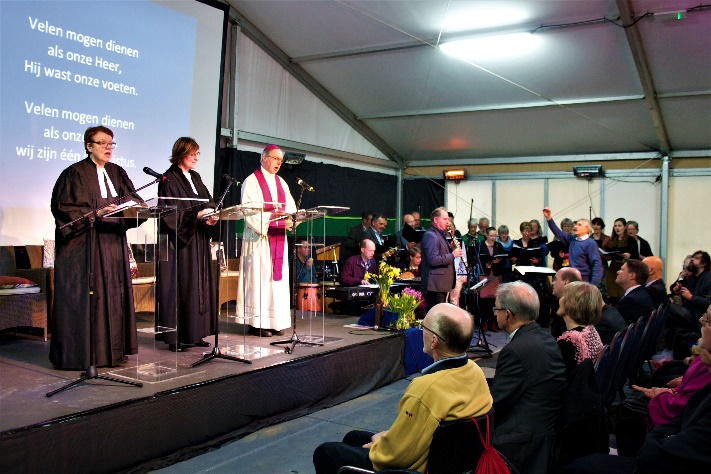
Apr 3, 2017 | Focolare Worldwide, Senza categoria
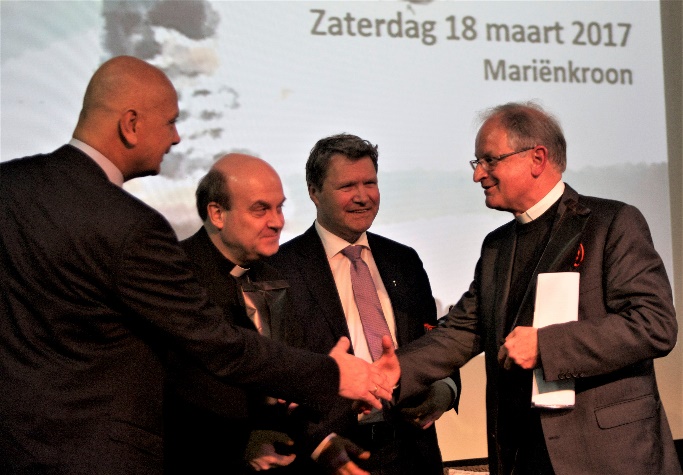 After the historic encounter between the World Lutheran Federation and the Catholic Church last October in Sweden, the 500th anniversary of the Reform has given rise to ecumenical events around the whole world. The March 18th On the Way to Unity Meeting was promoted by the Catholic Athanasios en Willibrord Association for Ecumenism and the Focolare Movement. The date chosen was meant to coincide with the departure of Chiara Lubich, whose commitment to Christian unity is famous. The encounter took place at the Focolare’s Marienkroon village, a hundred kilometres from Amsterdam. Three hundred and eighty people including prominent leaders of several Christian denominations attended. The event showed a people on the way, as the title of the event wished to express. A broad tent was set up that was filled to the brink, until an addition was added for the overflow crowd. The five-hour event included reflection, meals, testimonies, songs and artistic presentations. The highpoint was the moment of common prayer. The large turnout and the fraternal atmosphere created among all, including the leaders of the Churches, made the day seem historic as the director of the Catholic Association for Ecumenism, Geert van Dartel, affirmed. But it was also an “ecumenical feast,” one of the participants remarked.
After the historic encounter between the World Lutheran Federation and the Catholic Church last October in Sweden, the 500th anniversary of the Reform has given rise to ecumenical events around the whole world. The March 18th On the Way to Unity Meeting was promoted by the Catholic Athanasios en Willibrord Association for Ecumenism and the Focolare Movement. The date chosen was meant to coincide with the departure of Chiara Lubich, whose commitment to Christian unity is famous. The encounter took place at the Focolare’s Marienkroon village, a hundred kilometres from Amsterdam. Three hundred and eighty people including prominent leaders of several Christian denominations attended. The event showed a people on the way, as the title of the event wished to express. A broad tent was set up that was filled to the brink, until an addition was added for the overflow crowd. The five-hour event included reflection, meals, testimonies, songs and artistic presentations. The highpoint was the moment of common prayer. The large turnout and the fraternal atmosphere created among all, including the leaders of the Churches, made the day seem historic as the director of the Catholic Association for Ecumenism, Geert van Dartel, affirmed. But it was also an “ecumenical feast,” one of the participants remarked.  “Unity in diversity is not something that we can ‘fabricate’ on our own, but it is a gift from God,” warned Catholic Luther scholar, Hubertus Blaumeiser from the Focolare’s international Abba School centre for studies. Looking back at Lund’s ecumenical agenda, he cited a few words from Chiara Lubich: “The music gets written in Heaven.” It’s up to us to learn how to read that music. In any case, he went on, from the moment that Jesus gave his life for everyone on the cross, unity has been a given. Our task is to respond to that. This explains the first of five “ecumenical imperatives” that were signed in Lund, which recommend that we always begin from the perspective of unity and never separation. But what must be done so that this unity becomes concrete in the midst of oftentimes difficult situations after years of division? Placing ourselves behind the Triune God of Jesus, we are all called to an exodus,” said Blaumeiser, to go out of ourselves and learn to “think and live with the other as our starting point,” and that is “not only at the level of individuals, but also at the level of entire faith communities.” Ultimately, ecumenism is a process to be carried out with Jesus: from death to resurrection. “Unity begins wherever one has the courage to face the difficulty, to enter in with Jesus into the wounds of separation, welcoming one another even when that can be tiresome and difficult. The “ecumenical imperatives” say that we have to let ourselves be changed by the encounter with the other and thereby seek the visible unity [of Christians] and bear witness to the power of the Gospel together. The president of the Dutch Catholic Bishops Conference, Bishop Van den Hende; the General Secretary of the Protestant Churches of the Netherlands, Dr Reuver; and National Coordinator of the Pentecostal Community, Peter Sleebos, responded to those ideas. Commenting on the orientations that were described, they expressed further motives and thoughts, drawing on their own faith traditions. In the afternoon ecumenical testimonies were presented that illustrated what Chiara Lubich liked to call the “dialogue of life”. This was followed by an open discussion with the presenters. One participant commented: “This Saturday we managed to ‘play’ the beautiful notes of the music that is written in Heaven ‘together’.” “This meeting,” declared Pastor René De Reuver to the Catholic Journal, “was very special. I experienced the presence of Christ in the enthusiasm, in the communion and in the passion for union in Him. This doesn’t take away the differences, but leads us to enrich one another mutually.”
“Unity in diversity is not something that we can ‘fabricate’ on our own, but it is a gift from God,” warned Catholic Luther scholar, Hubertus Blaumeiser from the Focolare’s international Abba School centre for studies. Looking back at Lund’s ecumenical agenda, he cited a few words from Chiara Lubich: “The music gets written in Heaven.” It’s up to us to learn how to read that music. In any case, he went on, from the moment that Jesus gave his life for everyone on the cross, unity has been a given. Our task is to respond to that. This explains the first of five “ecumenical imperatives” that were signed in Lund, which recommend that we always begin from the perspective of unity and never separation. But what must be done so that this unity becomes concrete in the midst of oftentimes difficult situations after years of division? Placing ourselves behind the Triune God of Jesus, we are all called to an exodus,” said Blaumeiser, to go out of ourselves and learn to “think and live with the other as our starting point,” and that is “not only at the level of individuals, but also at the level of entire faith communities.” Ultimately, ecumenism is a process to be carried out with Jesus: from death to resurrection. “Unity begins wherever one has the courage to face the difficulty, to enter in with Jesus into the wounds of separation, welcoming one another even when that can be tiresome and difficult. The “ecumenical imperatives” say that we have to let ourselves be changed by the encounter with the other and thereby seek the visible unity [of Christians] and bear witness to the power of the Gospel together. The president of the Dutch Catholic Bishops Conference, Bishop Van den Hende; the General Secretary of the Protestant Churches of the Netherlands, Dr Reuver; and National Coordinator of the Pentecostal Community, Peter Sleebos, responded to those ideas. Commenting on the orientations that were described, they expressed further motives and thoughts, drawing on their own faith traditions. In the afternoon ecumenical testimonies were presented that illustrated what Chiara Lubich liked to call the “dialogue of life”. This was followed by an open discussion with the presenters. One participant commented: “This Saturday we managed to ‘play’ the beautiful notes of the music that is written in Heaven ‘together’.” “This meeting,” declared Pastor René De Reuver to the Catholic Journal, “was very special. I experienced the presence of Christ in the enthusiasm, in the communion and in the passion for union in Him. This doesn’t take away the differences, but leads us to enrich one another mutually.”
Apr 2, 2017 | Senza categoria
- Data di Morte: 03/04/2017
- Branca di Appartenenza: Focolarino
- Nazione: Brazil
Apr 2, 2017 | Non categorizzato
Chiara Lubich, when speaking to a group of young people gathered in Loppiano for their course of formation, revealed the secret of her long experience in dialogue: to listen to others in a profound and sincere way, patiently and without hurry, in order to get to know them and to appreciate them in their cultural diversity. This is the way which encourages others also to listen, and is therefore the basis for a fruitful dialogue. https://vimeo.com/155508846
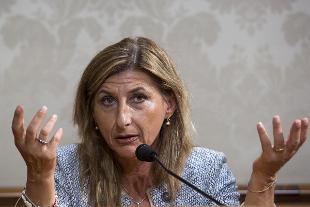
Apr 1, 2017 | Non categorizzato
 Lampedusa Mayor Giuseppina Nicolini was awarded the UNESCO’s peace prize along with French NGO SOS Méditerranée for “her great service to humanity and her constant commitment in saving countless migrants and refugees and receiving them on the Italian island and in other parts of Italy”. The mayor will be present for the 1st May activities in Loppiano and at the Youth for a United World Meeting, to be held also in Loppiano.
Lampedusa Mayor Giuseppina Nicolini was awarded the UNESCO’s peace prize along with French NGO SOS Méditerranée for “her great service to humanity and her constant commitment in saving countless migrants and refugees and receiving them on the Italian island and in other parts of Italy”. The mayor will be present for the 1st May activities in Loppiano and at the Youth for a United World Meeting, to be held also in Loppiano.
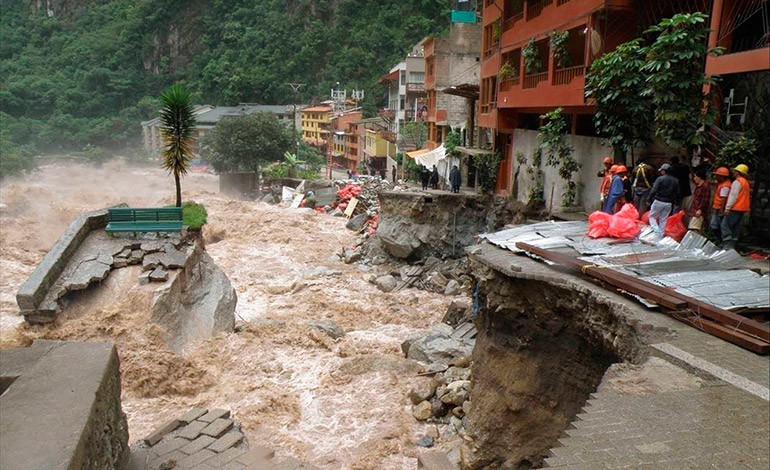
Apr 1, 2017 | Non categorizzato
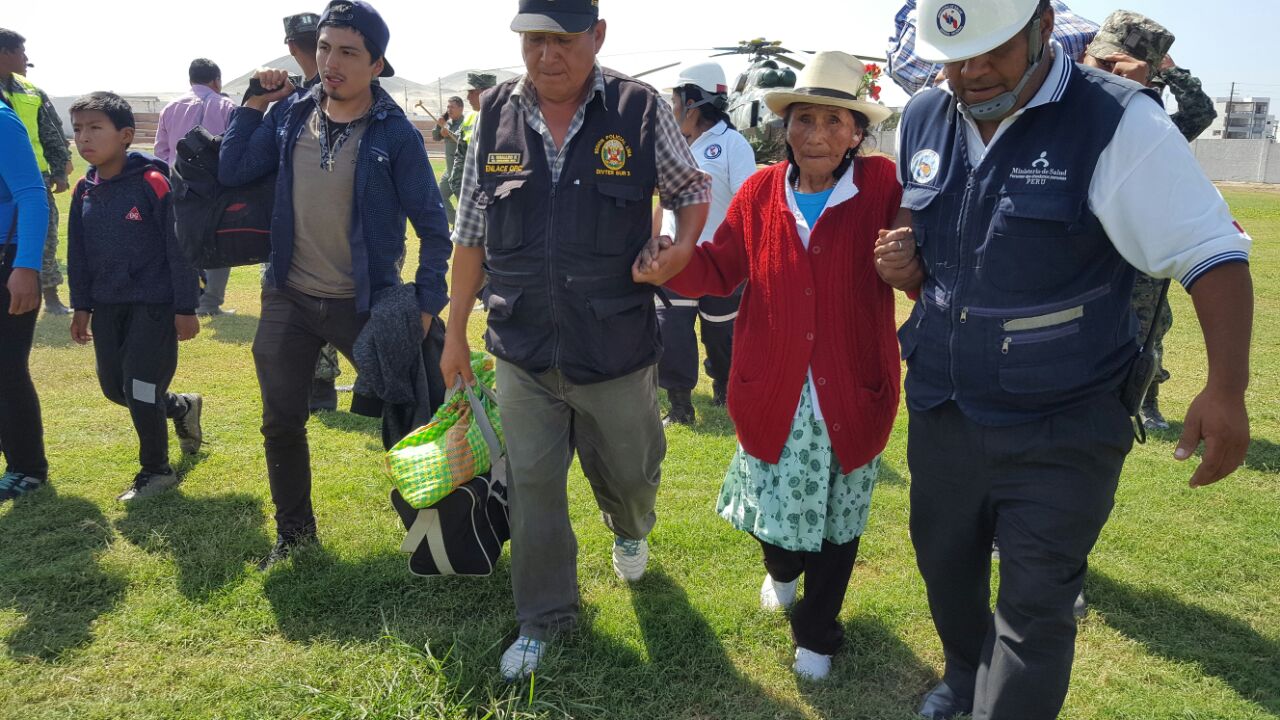 In the face of “the environmental disaster that struck Peru (…) we believe in God’s love, and pray together for the victims, entrusting those suffering from so many difficulties and discomfort“.This was what Maria Voce, Focolare President, wrote to the community of the Movement in the South American country struck by violent storms and floods. Some days before, the Pope had prayed during the Angelus, ensuring his support for the population. “The phenomenon known as the ‘coastal Niño‘, they wrote from Perù, “has produced a 10° rise in the usually cold waters of the Pacific. Combined with a mass of hot air coming from the Caribbean, it has caused a thickening of enormous masses of vapour that condensed over the Andes, in the central zone of Perù, provoking continual rains, that were also real outbursts of rain and violent storms. An enormous mass of water poured over the coastal cities. The figures today report hundreds of deaths and dispersed people, over 200 wounded, and almost 800,000 people who lost their homes or suffered damages. The Government was unprepared and was delayed in the first interventions, but is now in full action.” “But what is surprising is the fantastic reaction of the public and private institutions and especially the members of the community,” they continued. There would be no end to the reports of real solidarity and charity outflowing from the heart of man in moments like this. In the meantime, not only relief aid was sent by the nearby countries: Ecuador (in part struck by similar events in the south of the country), Colombia, Chile, Bolivia, Argentina, Paraguay, Brazil, Uruguay, and the USA; over a 100,000 dollars came from the Pope!
In the face of “the environmental disaster that struck Peru (…) we believe in God’s love, and pray together for the victims, entrusting those suffering from so many difficulties and discomfort“.This was what Maria Voce, Focolare President, wrote to the community of the Movement in the South American country struck by violent storms and floods. Some days before, the Pope had prayed during the Angelus, ensuring his support for the population. “The phenomenon known as the ‘coastal Niño‘, they wrote from Perù, “has produced a 10° rise in the usually cold waters of the Pacific. Combined with a mass of hot air coming from the Caribbean, it has caused a thickening of enormous masses of vapour that condensed over the Andes, in the central zone of Perù, provoking continual rains, that were also real outbursts of rain and violent storms. An enormous mass of water poured over the coastal cities. The figures today report hundreds of deaths and dispersed people, over 200 wounded, and almost 800,000 people who lost their homes or suffered damages. The Government was unprepared and was delayed in the first interventions, but is now in full action.” “But what is surprising is the fantastic reaction of the public and private institutions and especially the members of the community,” they continued. There would be no end to the reports of real solidarity and charity outflowing from the heart of man in moments like this. In the meantime, not only relief aid was sent by the nearby countries: Ecuador (in part struck by similar events in the south of the country), Colombia, Chile, Bolivia, Argentina, Paraguay, Brazil, Uruguay, and the USA; over a 100,000 dollars came from the Pope!  Town halls, supermarkets, parishes, institutions of various Christian churches and of other religions have created Collection Centres for basic essentials, nonperishable food, cleaning products, blankets, etc. Also the Focolare opened a Collection Centre in Lima. “Some families of the community,” they said, “were struck by the floods, especially to the north of the country. In particular, one of our very poor communities close to Lima, suffered intense rains for which they were not prepared, since for 60 years it had not rained in that area. The nuns of a nearby community, who helped in our adoption project, say that many of our children are homeless, but are all alive…”. There is very little electricity throughout the country and water is lacking. A 70-year-old man had a stroke but there was no way of bringing him to the hospital about 50 km away… The benevolence of the members is impressive and immediately generates reciprocity. We sent help to a family in Chulucanas, whose house roof and walls were damaged, but we found out that with other families of the parish and the Movement, they started to help others with greater needs.”
Town halls, supermarkets, parishes, institutions of various Christian churches and of other religions have created Collection Centres for basic essentials, nonperishable food, cleaning products, blankets, etc. Also the Focolare opened a Collection Centre in Lima. “Some families of the community,” they said, “were struck by the floods, especially to the north of the country. In particular, one of our very poor communities close to Lima, suffered intense rains for which they were not prepared, since for 60 years it had not rained in that area. The nuns of a nearby community, who helped in our adoption project, say that many of our children are homeless, but are all alive…”. There is very little electricity throughout the country and water is lacking. A 70-year-old man had a stroke but there was no way of bringing him to the hospital about 50 km away… The benevolence of the members is impressive and immediately generates reciprocity. We sent help to a family in Chulucanas, whose house roof and walls were damaged, but we found out that with other families of the parish and the Movement, they started to help others with greater needs.”
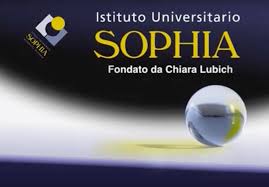
Mar 31, 2017 | Non categorizzato
 Ten years from its founding, Sophia University Institute expands from one course on Fundamentals and Prospectives of a Culture of Unity, to three distinct Master’s Degrees: Economic & Political Sciences, and Trinitarian Ontology & Culture of Unity. A programme that offers young people from around the world, an inter-discplinary and trans-disciplinary education focused on innovative sectors of social and civil economy, communion, participatory policies and their relationship to theology and philosophy. “With the addition of the new academic titles, Economic and Political Sciences and Trinitarian Ontology,” president of Sophia University Institute, Piero Coda, says that “Sophia offers students an academic degree which joins together the unitarian sense of the human adventure with a scientific degree that contributes to the total development of the individual and society.” Benedetto Gui, Coordinator of the Economy and Management Department, adds: “Among the novelties is the addition of the English language for several of the courses in the Economic and Political Sciences Degree programme.” He continues: “In an age when young people don’t have the courage to propose ideals to live by, Sophia seeks to found its vision of the world on a deep-rooted respect for the human person, including his or her culture, religion and views – and to look towards a world without hatred, war, oppression exlusion, or superiority over others. In the field of economics this doesn’t mean having a recipe ready to be imposed, but looking beyond today’s dominant reductive vision of economics and economic realtions, even though scientific reasearch is demonstrating the inadequacy of such a vision.” The students at Sophia come from 30 countries and belong to different religions. The Institute offers them a course of study that joins learning – through listening, discussing, reading, attending lectures – to real life. Applying the logic of openness to others as the very method for approaching learning which creates community life in the classroom, corriders and residences where students have an extraordinary intercultural experience. Gui continues: “What we strive to bring about together with the students is, on the one hand, the acquisition of those skills that one would expect to find in any graduate in the field of economics and, on the other hand, a deeper understanding of that economic vision which I mentioned before, through the examination of new lines of research and contact with economic projects that put that vision into practice . . . topics that are often neglected in university settings.” Once they’ve completed their studies, how do the students approach the work world? “Recruiters are well aware that knowledge of the subject is not enough to make a young person a valid member of an organisation. The ability to dialogue with the bearers of other types of knowledge is also necessary, knowing how to collaborate and to assume responsibilities. Our experience thus far has shown us that our students are appreciated not only for their academic preparation, but also for other skills that the experience at Sophia is particularly adept at developing in people. Be careful though: Education shouldn’t be be geared towards finding a job. It should also promote the growth of the human person and develop a capacity for personal and group intitiative which is also a precious contribution towards society.”
Ten years from its founding, Sophia University Institute expands from one course on Fundamentals and Prospectives of a Culture of Unity, to three distinct Master’s Degrees: Economic & Political Sciences, and Trinitarian Ontology & Culture of Unity. A programme that offers young people from around the world, an inter-discplinary and trans-disciplinary education focused on innovative sectors of social and civil economy, communion, participatory policies and their relationship to theology and philosophy. “With the addition of the new academic titles, Economic and Political Sciences and Trinitarian Ontology,” president of Sophia University Institute, Piero Coda, says that “Sophia offers students an academic degree which joins together the unitarian sense of the human adventure with a scientific degree that contributes to the total development of the individual and society.” Benedetto Gui, Coordinator of the Economy and Management Department, adds: “Among the novelties is the addition of the English language for several of the courses in the Economic and Political Sciences Degree programme.” He continues: “In an age when young people don’t have the courage to propose ideals to live by, Sophia seeks to found its vision of the world on a deep-rooted respect for the human person, including his or her culture, religion and views – and to look towards a world without hatred, war, oppression exlusion, or superiority over others. In the field of economics this doesn’t mean having a recipe ready to be imposed, but looking beyond today’s dominant reductive vision of economics and economic realtions, even though scientific reasearch is demonstrating the inadequacy of such a vision.” The students at Sophia come from 30 countries and belong to different religions. The Institute offers them a course of study that joins learning – through listening, discussing, reading, attending lectures – to real life. Applying the logic of openness to others as the very method for approaching learning which creates community life in the classroom, corriders and residences where students have an extraordinary intercultural experience. Gui continues: “What we strive to bring about together with the students is, on the one hand, the acquisition of those skills that one would expect to find in any graduate in the field of economics and, on the other hand, a deeper understanding of that economic vision which I mentioned before, through the examination of new lines of research and contact with economic projects that put that vision into practice . . . topics that are often neglected in university settings.” Once they’ve completed their studies, how do the students approach the work world? “Recruiters are well aware that knowledge of the subject is not enough to make a young person a valid member of an organisation. The ability to dialogue with the bearers of other types of knowledge is also necessary, knowing how to collaborate and to assume responsibilities. Our experience thus far has shown us that our students are appreciated not only for their academic preparation, but also for other skills that the experience at Sophia is particularly adept at developing in people. Be careful though: Education shouldn’t be be geared towards finding a job. It should also promote the growth of the human person and develop a capacity for personal and group intitiative which is also a precious contribution towards society.”
Mar 30, 2017 | Senza categoria
On 18 March 2017, the Youth for a United World Movement was awarded the 7th edition of the prize entitled: “Chiara Lubich: Manfredonia, City of Universal Brotherhood”, promoted by the New World Association (Italy). The award was given on the following grounds: “The Youth for a United World Movement is spread over five continents and includes people of different races, nationalities, cultures, Christian denominations and religions, as well as persons of no religious conviction. It is commended for giving witness that a united world is possible, for striving to make humanity one family through social and cultural actions which respect one another’s identity. The commitment to work and spread the UNITED WORLD PROJECT has been greatly praised.”
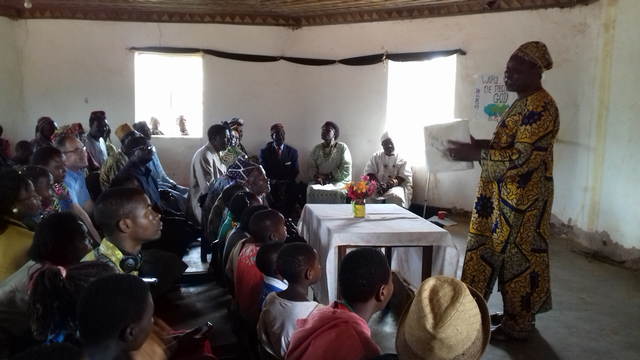
Mar 30, 2017 | Non categorizzato
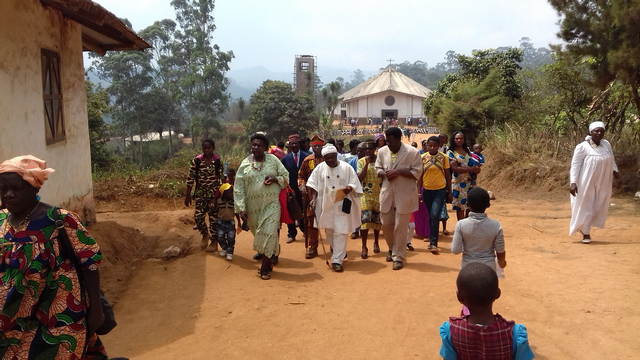 “We have renewed the pact and promise to continue living in the spirit of love, unity and peace which have changed our lives.” These were the words that the Chiefs of the Kingdom of Fonjumetaw wrote to Maria Voce, President of the Focolare Movement, when they gathered together with their communities last 5 March in said Kingdom, a village in the Cameroon forest. About 200 people participated in the event which took root in the history of these people. A strong bond unites the vast tropical region around Fonjumetaw to Fontem, where for the first time, in 1966, two focolarini doctors arrived to help the local population to overcome the diseases that were causing the high infant mortality rate. Fifty years ago, the Bangwa people were saved from the risk of extinction. Last September the Fons (traditional chiefs of the villages in the African region) went to Rome for the Jubilee of Mercy and to pay homage to Chiara Lubich (“Mafua Ndem,” Queen sent by God, as they named her), before her tomb at the International Focolare Centre in Rocca di Papa. The African delegation participated also in St. Peter’s Square in the meeting with Pope Francis and met the current President of the Focolare Movement, Maria Voce, and the Co-President, Jesús Morán.
“We have renewed the pact and promise to continue living in the spirit of love, unity and peace which have changed our lives.” These were the words that the Chiefs of the Kingdom of Fonjumetaw wrote to Maria Voce, President of the Focolare Movement, when they gathered together with their communities last 5 March in said Kingdom, a village in the Cameroon forest. About 200 people participated in the event which took root in the history of these people. A strong bond unites the vast tropical region around Fonjumetaw to Fontem, where for the first time, in 1966, two focolarini doctors arrived to help the local population to overcome the diseases that were causing the high infant mortality rate. Fifty years ago, the Bangwa people were saved from the risk of extinction. Last September the Fons (traditional chiefs of the villages in the African region) went to Rome for the Jubilee of Mercy and to pay homage to Chiara Lubich (“Mafua Ndem,” Queen sent by God, as they named her), before her tomb at the International Focolare Centre in Rocca di Papa. The African delegation participated also in St. Peter’s Square in the meeting with Pope Francis and met the current President of the Focolare Movement, Maria Voce, and the Co-President, Jesús Morán. 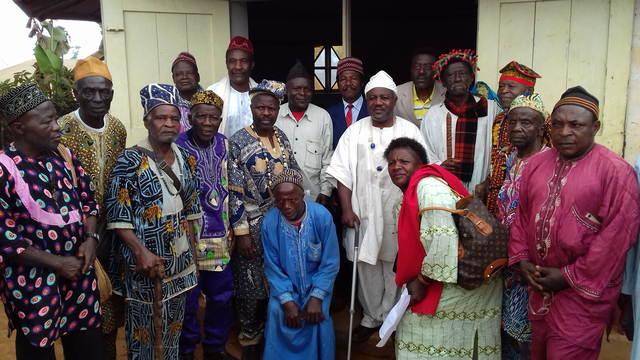 The Jubilee gave a new impulse to the New Evangelisation, strengthening the bonds of fraternity which these villages today are trying hard to live. The meeting of 5 March took on this meaning. The Fon recounted the “pilgrimage” to Rome with the other Fons of the zone, with Bishop Andrew Nkea Fuanya, and Bishop Emeritus, Francis Teke Lysinge. Upon inviting all to take a new step in the life of fraternity, he announced a “year of reconcilement.” Everyone agreed with joy. And in a celebrative atmosphere the youth, adults and children hugged one another to seal this commitment. One of the Chiefs presented the “dice of love”. Then he cast it in the air. The phrase that appeared was “love one another” and it was a confirmation also through a game, of the commitment each one wanted to undertake.
The Jubilee gave a new impulse to the New Evangelisation, strengthening the bonds of fraternity which these villages today are trying hard to live. The meeting of 5 March took on this meaning. The Fon recounted the “pilgrimage” to Rome with the other Fons of the zone, with Bishop Andrew Nkea Fuanya, and Bishop Emeritus, Francis Teke Lysinge. Upon inviting all to take a new step in the life of fraternity, he announced a “year of reconcilement.” Everyone agreed with joy. And in a celebrative atmosphere the youth, adults and children hugged one another to seal this commitment. One of the Chiefs presented the “dice of love”. Then he cast it in the air. The phrase that appeared was “love one another” and it was a confirmation also through a game, of the commitment each one wanted to undertake.  Then followed the experiences and staging of six points of the art of loving. One of the Chiefs recounted a strong experience: for many years he had not forgiven someone for an episode in which he had felt offended, but after hearing the invitation of the Pope to forgive and forget in the year of reconcilement, he was able to do so. At the conclusion, a festive moment ensued with the Fon and Mafua (Queen), and all the Chiefs, VIPS and focolarini. The Mafua talked about her encounters with Chiara in 2000 on the occasion of her visit to Cameroon, the “pilgrimage” of the delegation of 40 people to the Centre of the Focolare Movement in Rome, and the desire to spread the life of “Mother Chiara” amongst her people. The Chiefs’ letter to Emmaus, 17 years after Chiara’s last visit in these regions, sealed the commitment and the desire of all. These New Evangelisation meetings will continue. This is why the Fon of Fonjumetaw assigned one of the Chiefs to take charge of them. The next is set for 2 April.
Then followed the experiences and staging of six points of the art of loving. One of the Chiefs recounted a strong experience: for many years he had not forgiven someone for an episode in which he had felt offended, but after hearing the invitation of the Pope to forgive and forget in the year of reconcilement, he was able to do so. At the conclusion, a festive moment ensued with the Fon and Mafua (Queen), and all the Chiefs, VIPS and focolarini. The Mafua talked about her encounters with Chiara in 2000 on the occasion of her visit to Cameroon, the “pilgrimage” of the delegation of 40 people to the Centre of the Focolare Movement in Rome, and the desire to spread the life of “Mother Chiara” amongst her people. The Chiefs’ letter to Emmaus, 17 years after Chiara’s last visit in these regions, sealed the commitment and the desire of all. These New Evangelisation meetings will continue. This is why the Fon of Fonjumetaw assigned one of the Chiefs to take charge of them. The next is set for 2 April.
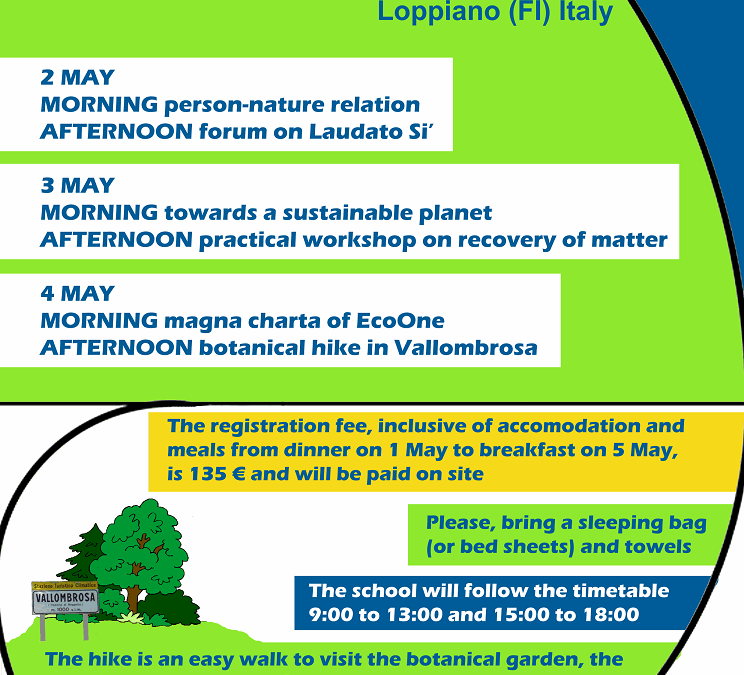
Mar 29, 2017 | Non categorizzato
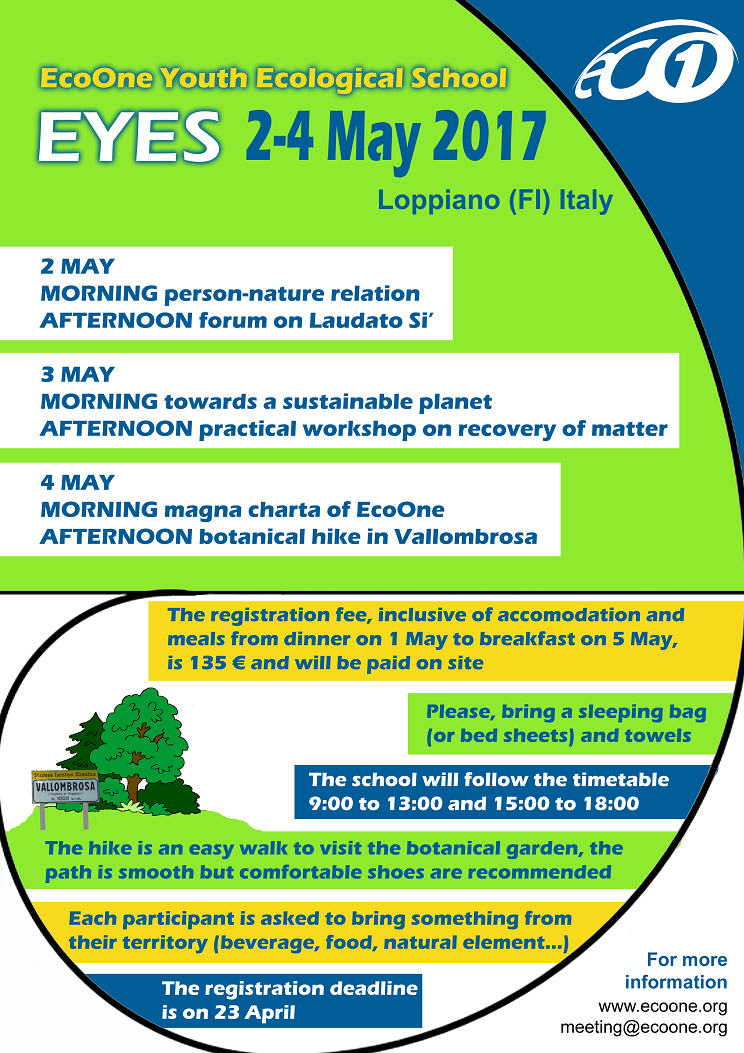 The Earth, our common home, is protesting. It seems to be turning more and more into a huge garbage dump. Its temperature is dramatically increasing and the depletion of natural resources makes it impossible to sustain the current level of consumption by the richest countries. Bio-diversity disappears and the quality of human life deteriorates. What is happening calls for an urgent need to undergo a bold cultural revolution. No one wants to regress to the neanderthal era, but it is essential to change direction and to work out a new model of development. The International EcoOne cultural initiative invites you to an ecological school to be held 2-4 May 2017 in Loppiano, Italy. It is aimed at young people, but open to all those who wish to look with new eyes at the relationship between human beings and nature. To subscribe please fill out the online form You can find more information in the attached flyer. The EcoOne Committee
The Earth, our common home, is protesting. It seems to be turning more and more into a huge garbage dump. Its temperature is dramatically increasing and the depletion of natural resources makes it impossible to sustain the current level of consumption by the richest countries. Bio-diversity disappears and the quality of human life deteriorates. What is happening calls for an urgent need to undergo a bold cultural revolution. No one wants to regress to the neanderthal era, but it is essential to change direction and to work out a new model of development. The International EcoOne cultural initiative invites you to an ecological school to be held 2-4 May 2017 in Loppiano, Italy. It is aimed at young people, but open to all those who wish to look with new eyes at the relationship between human beings and nature. To subscribe please fill out the online form You can find more information in the attached flyer. The EcoOne Committee

 Hundreds of thousands of teenagers leading the worldwide sports relay race. Boys and girls from different ethnic groups, cultures and religions race together to bear witness to their commitment to peace and to promote a way to reach this peace : the Golden Rule. The race is promoted by the Teens for Unity of the Focolare Movement. It takes place every year on the first Sunday of May from 11:00 am to 12:00 noon (in the different time zones), during the “United World Week” which is part of the United World Project. It’s an event that in previous years has involved over 100,000 teenagers in various cities of every corner of the globe. The baton passes from one time zone to the next making it also an opportunity for exchanges between the places involved. At different latitudes, sporting events, acts of solidarity and experiences of active citizenship get under way, especially in places where solitude, poverty and marginalization prevail. Personalities from the world of sport and culture, and civil and religious authorities take part in some cities. The website http://www.run4unity.net helps in preparations for the event and in real time collects the contributions from the social networks . The many messages, photos and videos received show the number and type of ideas in the pipeline in countries around the world. Organize Run4Unity in your city! Download Run4Unity description: PDF PPT
Hundreds of thousands of teenagers leading the worldwide sports relay race. Boys and girls from different ethnic groups, cultures and religions race together to bear witness to their commitment to peace and to promote a way to reach this peace : the Golden Rule. The race is promoted by the Teens for Unity of the Focolare Movement. It takes place every year on the first Sunday of May from 11:00 am to 12:00 noon (in the different time zones), during the “United World Week” which is part of the United World Project. It’s an event that in previous years has involved over 100,000 teenagers in various cities of every corner of the globe. The baton passes from one time zone to the next making it also an opportunity for exchanges between the places involved. At different latitudes, sporting events, acts of solidarity and experiences of active citizenship get under way, especially in places where solitude, poverty and marginalization prevail. Personalities from the world of sport and culture, and civil and religious authorities take part in some cities. The website http://www.run4unity.net helps in preparations for the event and in real time collects the contributions from the social networks . The many messages, photos and videos received show the number and type of ideas in the pipeline in countries around the world. Organize Run4Unity in your city! Download Run4Unity description: PDF PPT 




 In the face of “the environmental disaster that struck
In the face of “the environmental disaster that struck 




